


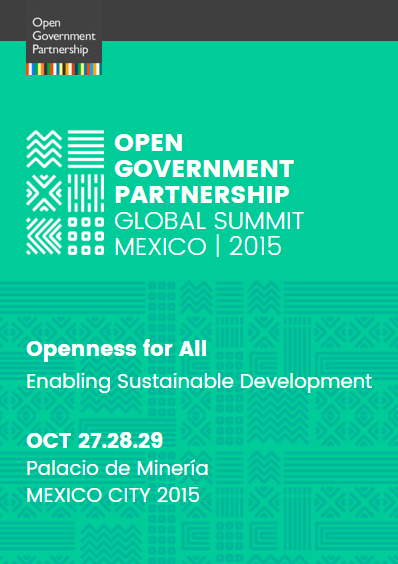 On October 28-29th, the Open Government Partnership Global Summit took place in Mexico City, Mexico; While on October 27th, the OGP Civil Society Day was held within the above-mentioned OGP Summit.
On October 28-29th, the Open Government Partnership Global Summit took place in Mexico City, Mexico; While on October 27th, the OGP Civil Society Day was held within the above-mentioned OGP Summit.
The Open Government Partnership Global Summit Mexico 2015 is held in every two years and it is the largest gathering of open government practitioners from all over the world. This year, the summit gathered around 1,500 participants - including representatives from civil society organizations, businesses and governments. Among the attendees were the representatives of the IDFI: Director of IDFI and Co-chairman of the Open Government Georgia's Forum - Giorgi Kldiashvili, Chairman - Levan Avalishvili and Project Coordinator - Davit Maisuradze. Moreover, with the support of the UNDP and the EU, the IDFI ensured the attendance of the MP - Tamar Kordzaia and the Head of Public Relations and Information Department - Nino Beradze at the OGP Global Summit. Ketevan Tsanava and Zurab Sanikidze from the Analytical Department of the Ministry of Justice of Georgia and Giorgi Oniani, Deputy Executive Director of the Transparency International – Georgia also attended the event.
The OGP initiative is a multilateral initiative and intends to provide a platform for domestic reformers to make their governments more responsive, accountable and transparent to their citizens.
Georgia joined the Partnership in 2011 and since December, 2014, IDFI has been implementing the project 'Supporting Involvement of the Parliament of Georgia in Open Government Partnership Initiative'. The Project is funded in the framework of the EU and the Parliament of Georgia Program: “Strengthening the System of Parliamentary Democracy in Georgia Project Document” which is implemented by the United Nations Development Programme (UNDP). 'Supporting Involvement of the Parliament of Georgia in Open Government Partnership Initiative' aims to promote parliamentary openness and transparency, increase citizen engagement into the legislative processes through the involvement of Parliament in the OGP.
The OGP Civil Society Day was traditionally held the day before the Summit to provide an informal opportunity for civil society actors involved in the OGP to connect and interact. The OGP believes, CSD is a good chance for the civil society actors to exchange the ideas and have the conversations necessary for strengthening national OGP processes in future. Furthermore, the objective of the CSD is that the OGP civil society community is energized, connected and ready for both the OGP Summit and for engaging with the OGP process in their own countries.

The OGP Civil Society Day was organized around the following themes:
• Broaden: provide space to explore why and how to broaden the actors, issues and countries involved in OGP;
• Deepen: discuss how to deepen the partnerships, push the level of ambition and create better plans;
• Connect: network with people working in different countries and on different issues, but facing similar realities;
• Inspire: hear inspiring stories from across the globe and explore new open government frontiers.
The Civil Society Day encompassed many enlightening sessions and workshops, focused on sharing stories and peer-learning. Participants of the event discussed how does civil society experience the OGP and how the OGP is delivering for civil society. Session considers data and stories from a range of sources - including the 2015 OGP Civil Society Engagement Survey that was filled in by over 600 people.
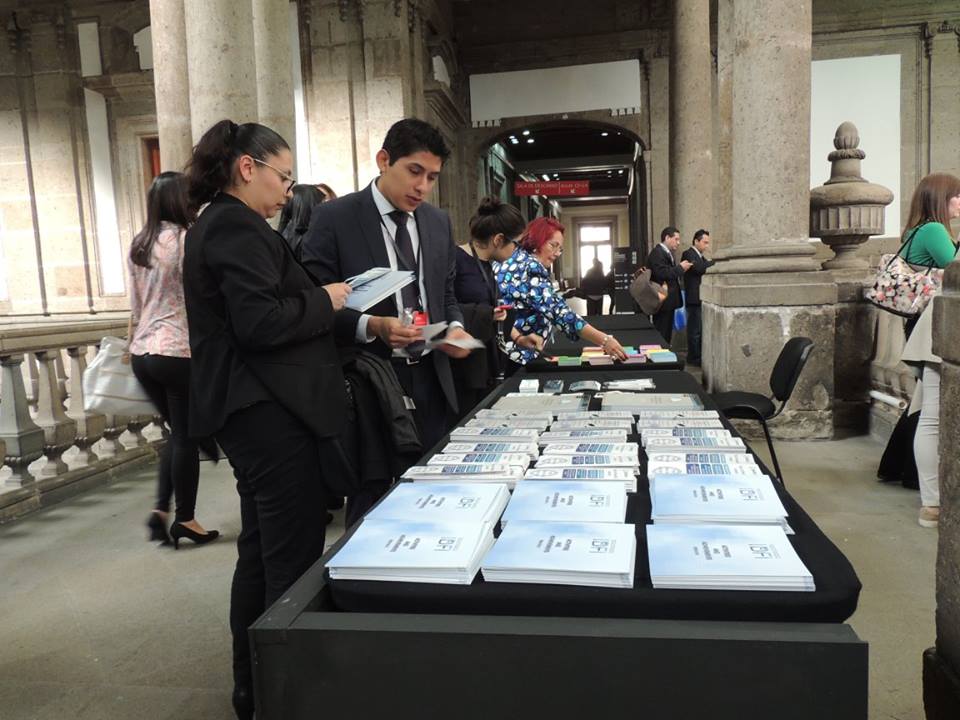 Within the OGP Civil Society Day Institute for Development of Freedom of Information (IDFI) organized an IDFI corner where the representatives of the institute introduced participants of the summit with the mission, goal and activities of the IDFI via various informational pamphlets, booklets, amusing stickers, markers, etc.
Within the OGP Civil Society Day Institute for Development of Freedom of Information (IDFI) organized an IDFI corner where the representatives of the institute introduced participants of the summit with the mission, goal and activities of the IDFI via various informational pamphlets, booklets, amusing stickers, markers, etc.
Notably, for the first time, the civil society members of the OGP Steering Committee presented an award to an OGP government - the OGP Government Champions Award.
The Award is intended to showcase the ideal co-creation dynamic between the government and civil society while elaborating the National Action Plan; to provide a high-level political visibility to the key actors who have played an immense role in upholding the OGP commitments and award the team that shared responsibility, authority and co-created the Action Plan, successfully managed safeguarding the voice of civil society actors in the National Action Plan development process and embraced the recommendations from civil society regardless political sensitivity of initiatives and difficulty for the government.
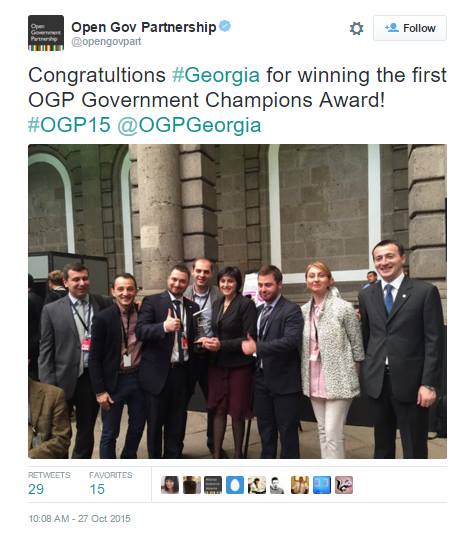
Institute for Development of Freedom of Information (IDFI) had nominated the Inter-Factional Working Group of the Parliament of Georgia since the Institute believes, Inter-Factional Group, consisting of 11 Members of Parliament from majority and minority factions, has made an active input in the process of elaboration of the Action Plan and putting forward the commitments, which the Parliament is supposed to implement in the years of 2015-2016.
Three semi-finalists (Georgia, Costa Rica and Sierra Leone) were selected by the Award selection committee and an award winner was determined by a public vote.
At the OGP Civil Society Day Giorgi Kldiashvili, Director of IDFI, explained the audience why he felt the Parliament of Georgia was going 'above and beyond the call of OGP duty' and why did Georgia deserved winning the contest, he described the process of collaboration among the MPs and the civil society representatives in the process of elaborating the Open Parliament Georgia Action Plan 2015-2016 and thanked donors - UNDP and EU for their support. After the speeches delivered by representatives of three finalist countries, attendees of the event had the last chance to vote for their preferred winning government.
Georgia was honored to become the winner of the OGP Government Champions Award, from 66 OGP participating countries.
The Chairman of the Parliament of Georgia, David Usupashvili mentioned in his address to the Parliament that on October 28th, on the date which marks 25 years since Georgia held its first multi-party elections, the country has become famous in Mexico by winning the first OGP Champions Award.
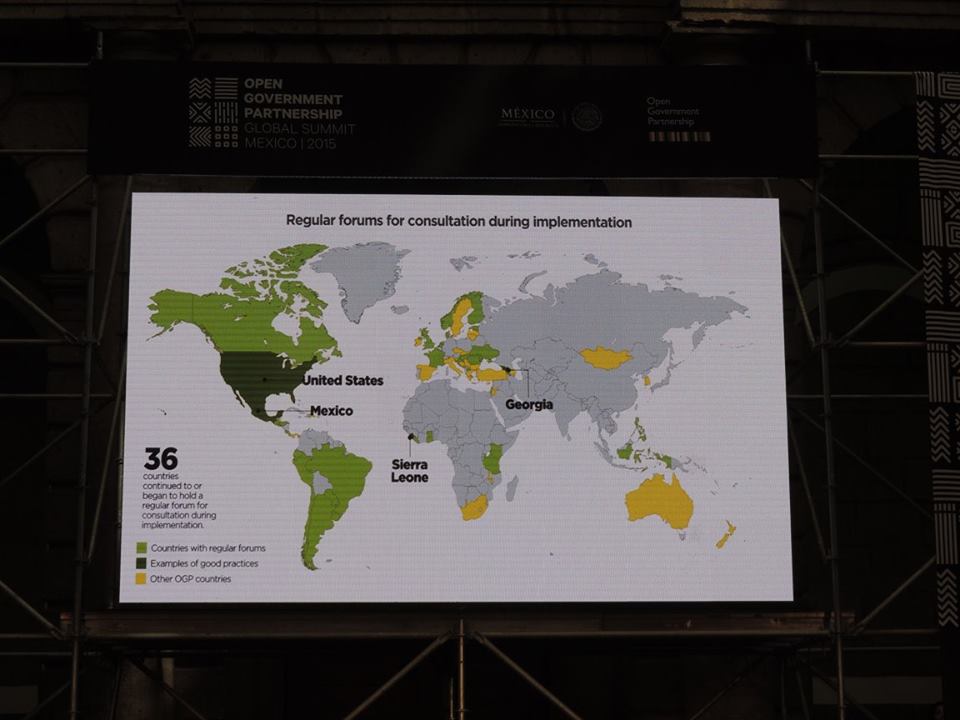 Moreover, at the opening ceremony of the OGP Civil Society Day, Georgia was showcased as the best practice country in engagement and collaboration with the civil society during the Action Plan implementation.
Moreover, at the opening ceremony of the OGP Civil Society Day, Georgia was showcased as the best practice country in engagement and collaboration with the civil society during the Action Plan implementation.
At the OGP Civil Society Day Giorgi Kldiashvili participated in the session of 'Best ways of involving the Legislative branch in the 'openness partnerships', along with John Wonderlich - Policy Director of Sunlight Foundation and Guillermo Avila - Researcher at the Center for Analysis and Research in Mexico. The primary objective of the session was to come up with a common vision about the work relationship between CSOs/PMOs (Parliamentary Monitoring Organizations) and Parliaments, towards the launch of the Open Parliament Network.
Kldiashvili also took part in the workshop titled as 'OGP Civil Society Knowledge Sharing - Working with Government on NAPs (National Action Plans)'. Patrice McDermott, Executive Director of OpenTheGovernment.org, Hilda Shafiq Ajeilat, President of Jordan Transparency Center JTC and other prominent speakers participated in the session. The session focused on drawing on CSO experiences from across the globe to share knowledge, identify strategies that work, and begin discussion toward ways to advance open government - and overcome obstacles in collaborations between national BSOs and their governments involved in the OGP processes. During the session, speakers were separated in groups, Georgia and Mexico presented in the same group and the vital lessons learned and messages delivered in the speeches of Giorgi Kldiashvili and Héctor Rubio are listed below:
• In Georgia civil society groups and government had aligning interests during the elaboration of the NAP which assisted development of commitments. While in Mexico, this was not the case. Mexican government does not want to combat human rights violations. Thus, civil society and government interests are different there.
• In Georgia, after the political transition and change of leadership in 2012, the new government wanted to demonstrate they were different from the previous one, and wanted to show they were not corrupt. This is not happening in Mexico which is suffering from widespread corruption.
• In Georgia, the strongest commitments of the NAP are focused on accountability. In Mexico, the commitments are focused on transparency. There is a huge difference, since transparency is evident in Mexico, access to information is ensured, but there is lack of accountability - an enormous deficiency when it comes to justice. Access to information is not equivalent to access to justice.
 Chairman of IDFI, Levan Avalishvili spoke about 'Citizen Centric Anti-Corruption Initiatives'. The workshop explored cutting-edge strategies, tools and methods that demonstrate constructive engagement and collaboration between civil society organizations and governments to address endemic corruption. The workshop participants (Vinay Bhargava, Chief Technical Adviser for Partnership for transparency Fund, Sarah Little, Programs and Communications Manager of Partnership for Transparency Fund and others) involved CSO and government representatives, as well as private sector interested in civic anticipation against systemic corruption.
Chairman of IDFI, Levan Avalishvili spoke about 'Citizen Centric Anti-Corruption Initiatives'. The workshop explored cutting-edge strategies, tools and methods that demonstrate constructive engagement and collaboration between civil society organizations and governments to address endemic corruption. The workshop participants (Vinay Bhargava, Chief Technical Adviser for Partnership for transparency Fund, Sarah Little, Programs and Communications Manager of Partnership for Transparency Fund and others) involved CSO and government representatives, as well as private sector interested in civic anticipation against systemic corruption.
Other topics of discussion during the OGP Civil Society Day were: 'The role of civil society in promoting global youth-led accountability', 'Civil society tools for strong NAPs', 'Understanding civic space: concepts, trends and affects', 'Police Transparency', 'Future of Open Government', and etc.
At the OGP Civil Society Day, Transparency International - Mexico presented a book titled 'Open Parliaments, Results and Expectations' and edited by Eduardo Bohorquez. Giorgi Kldiashvili, Director of IDFI and Co-chairman of the Open Government Georgia's Forum is a co-author of the book. After the presentation, through an interview format, authors of the book were questioned on the topics covered in the book. Answers and talks assisted attendees to learn more about the implememtation process of the Action Plan in Georgia, the experience in Latin America and the Mexican case.
Giorgi under the chapter of - Open Parliament in Georgia's OGP Action Plan - provides a brief overview of Georgia's recent history for better comprehending of a platform the country had to take off from and what challenges it faced. Giorgi claims: ''Georgia went through a long and painful process of civil war, internal political, and socio-economic problems at the end of the 20th Century. The heritage of secrecy and political influence in the government sector had significant influence and was a barrier to the creation of civil society in Georgia in those years." He adds that "Georgia, as part of the totalitarian Soviet Union, did not have the culture of western democracy at its independence. Development of human rights and open government started in Georgia from the dissolution of the Soviet State.' Thus, he explains that "the development of open government and anti-corruption policy in Georgia was a long process of creating various tools and measures, both legal and practical."

 Giorgi Kldiashvili underlines the importance of the Open Government Partnership initiative for Georgia by noting that OGP became "a very important platform for developing government integrity, transparency and accountability, public participation, public services, and innovations and technologies in the government sector."
Giorgi Kldiashvili underlines the importance of the Open Government Partnership initiative for Georgia by noting that OGP became "a very important platform for developing government integrity, transparency and accountability, public participation, public services, and innovations and technologies in the government sector."
In "Open Parliaments, Results and Expectations", Kldiashvili also analyses Open Parliament Georgia Action Plan (2015-2016) developed by the Inter-Factional Group of the Parliament of Georgia and the Open Parliament Georgia Working Group - comprising the representatives of international and non-governmental organizations.
Giorgi concludes the chapter by mentioning that "the successful process of legislative openness in Georgia was much dependent on the good will and support of the Parliament of Georgia. The Chairperson of the Parliament of Georgia was directly involved in the process."
The book also includes chapters such as: 'Citizen participation in legislative power: an argument to strengthen representation', 'A true partnership involves two,' 'Open Parliament and the challenge of evaluating legislative bodies', etc.
For downloading the book please go to link.
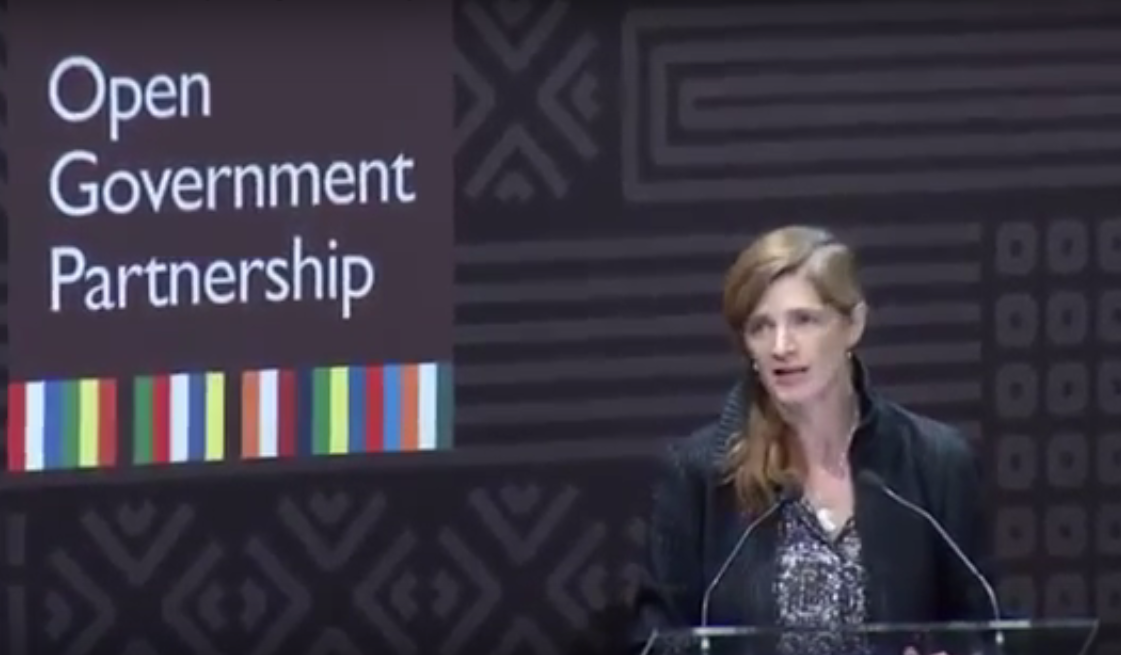
After the OGP Civil Society Day, the Open Government Partnership Global Summit Mexico 2015 was launched. At the opening ceremony, Samantha Power, the United States Ambassador to the United Nations, referred as an absolute champion of the idea of OGP, talked about the importance of including the UN Sustainable Development Goals (SDGs) in OGP, since it can make the partnership more relevant to people due to widespread inequality and poverty in the world. Samantha Power called on the world leaders to do a better job at holding "ourselves" accountable, part of which, she argued is looking at their respective countries' performance and examining where they fall short (including the USA). Furthermore, Samantha Power highlighted that part of accountability is listening and engaging civil society and their critics.
Ambassador also announced that in the coming year, President Obama will give an award to a reformer whose efforts embody the spirit of OGP in advocating for anti-corruption, transparency or accountability.
Please read the entire speech here.
Suneeta Kaimal, Deputy Director of Revenue Watch Institute – Natural Resource Charter and a civil society co-chair of the Open Government Partnership, was another impressive speaker at the OGP Summit opening ceremony. She addressed shortcoming of the Open Government Partnership and highlighted partnership's capacity for empowering people to take the lead and have a voice since governments can also benefit from the civil society expertise.
It must be noted that Suneeta Kaimal set Georgia as an example by claiming that: "Georgia has leveraged OGP to meet the demands of the people, to reinvent government, to combat corruption and to boost the economy. The first Action Plan focused primarily on access to information, as we know a critical first step. The second plan now opens up a whole host of new issues, from recruitment of civil servants and crime-mapping to participation at the local government level. The government has diversified the ministries involved, the national OGP Forum is a space of continuous dialogue between government and civil society, and they have just launched a new open parliament plan. Through meaningful participation, Georgia is concretely meeting the demands of citizens and filling their open government ambitions."
Suneeta Kaimal concluded that "the power of OGP lies in our ability to address problems of collective actions by drawing collective courage from such stories [Georgia's case]."
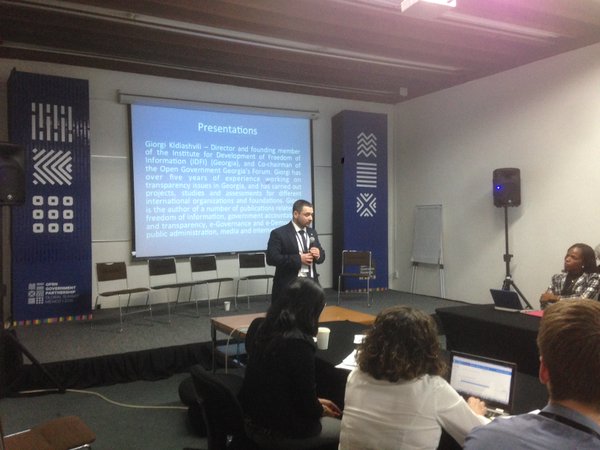 During a two-day OGP Global Mexico Summit, Director of IDFI and other representatives from Georgian delegation to Mexico participated in various sessions and discussions. Giorgi Kldiashvili discussed 'Open Parliament Action Plans - From Idea to Implementation', for which Julia Keutgen, Program Specialist at UNDP Brussels, served as a moderator. The objective of the discussion was to analyze the experiences of civil society and parliaments of Georgia, France, Chile and Mexico in developing and implementing national action plans. So that, the session could provide various lessons for the participants of the conference and spark interest to initiate additional open parliament action plans within OGP.
During a two-day OGP Global Mexico Summit, Director of IDFI and other representatives from Georgian delegation to Mexico participated in various sessions and discussions. Giorgi Kldiashvili discussed 'Open Parliament Action Plans - From Idea to Implementation', for which Julia Keutgen, Program Specialist at UNDP Brussels, served as a moderator. The objective of the discussion was to analyze the experiences of civil society and parliaments of Georgia, France, Chile and Mexico in developing and implementing national action plans. So that, the session could provide various lessons for the participants of the conference and spark interest to initiate additional open parliament action plans within OGP.
Ketevan Tsanava and Zurab Sanikidze from Analytical Department of the Ministry of Justice participated in the sessions of 'Implementing the 2030 Sustainable Development Agenda: The Open Government Guide Special Edition' and 'Permanent Consultation Forums: Fostering a Multi-Stakeholder Partnership to Advance Participation, Innovation and Accountability in OGP.' While Giorgi Oniani, Deputy Executive Director of Transparency International - Georgia, took part in discussion about 'Money, Politics and Transparency: How can OGP Support Openness in Political Financing?'
Other topics of discussion during the Open Government Partnership Global Summit Mexico 2015 were: Openness for All: The role for OGP in the 2030 Development agenda, Building Citizens' Trust in Justice and Security, Measuring Open Government From Citizens' Perspective, Network of Reformers, We will OGP EU! - Towards a more active role for European Union and Member States, etc.
Within the Open Government Partnership Global Summit, Georgian delegation (Director of IDFI, Giorgi Kldiashvili; Chairman of IDFI, Levan Avalishvili and MP, Tamar Kordzaia) met with Rafael Ortiz Fábrega, the President of the Legislative Assembly of Costa Rica.
During the meeting, delegations of Georgia and Costa Rica discussed bilateral relations between the countries. Representatives of the IDFI and Georgian MP, talked about Georgian experience of executed changes in the legislative branch and attained progress. They further shared information on civic engagement and involvement of NGOs in the legislative activities of the Parliament of Georgia.
Notably, Rafael Ortiz Fábrega expressed his volition to implement the principles of open parliament in Costa Rica according to the standards and principles of Georgian open parliament action plan, for which Georgian side pledged full support and assistance.
Giorgi Kldiashvili and Levan Avalishvili highlighted the role of civil society and non-governmental organizations in the process of elaboration of the Open Parliament Georgia Action Plan 2015-2016. They mentioned the Action Plan is a very ambitious document and a successful implementation of its principles mostly depend on the political will and readiness of the legislators and government of Georgia. Levan Avalishvili drew attention to the commitments encompassing accountability, access on information, technologies and innovations, and the importance of properly fulfilling them. 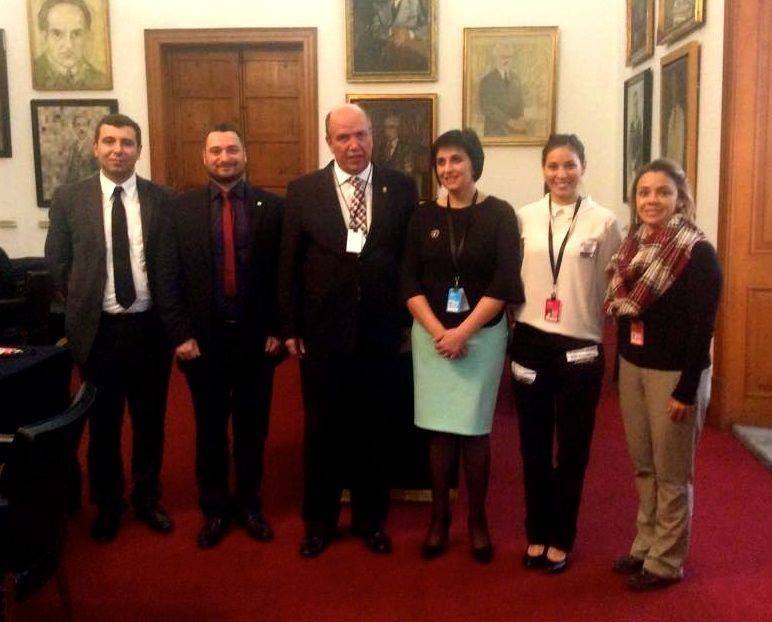
As the President of the Legislative Assembly of Costa Rica was interested how Georgia is implementing the Open Government Partnership principles, Georgian delegation discussed various mechanisms of the OGP; talked about forming of the Inter-Factional Group of the Parliament of Georgia, signing the Memorandum on Parliamentary Openness, by which the Parliament of Georgia officially joined the Open Government Partnership and the Declaration on Parliamentary Openness signed among the representatives of the NGOs and international organizations.
Within the meeting, representatives of Costa Rica and Georgia also discussed diplomatic ties of two counties. In particular, it was emphasized that the embassies of Costa Rica in Europe can provide a diplomatic coverage of Georgia.
"I am ready to discuss topic presented by you with the Ministry of Foreign Affairs of Costa Rica and consider covering Georgia from Europe" - claimed the President of the Legislative Assembly, Rafael Ortiz.
Georgian MP, Tamar Kordzaia discussed existing friendly ties between two countries. The MP claimed, she hopes friendly relations between Costa Rica and Georgia will further develop and deepen in the areas of mutual interest.
Regarding this, the MP, Tamar Kordzaia handed over an invitation letter of the Chairman of the Parliament of Georgia, David Usupashvili to the President of the Legislative Assembly of Costa Rica, Rafael Ortiz. Mr. Ortiz expressed his gratitude for the invitation and in return, invited Georgian side to Costa Rica.
Tamar Kordzaia thanked the representatives of Costa Rica for supporting territorial integrity and sovereignty of Georgia and expressed her hope that Costa Rica will continue its support for the Resolution of the UN General Assembly. The President of the Legislative Assembly of Costa Rica declared that the government of his country opposes any kind of aggression against the sovereign state and emphasized Costa Rica's support for the territorial integrity of Georgia.
The OGP Global Summit Mexico 2015 was a mix of people from civil society and governments who shared ideas and stories, pushed and inspired each other to propel further, more challenging reforms in their respective countries and implement more comprehensive NAPs, capable of meeting the needs of citizens and necessary for consolidation of democracy. On the other hand, Alexander Howard in his article published in the Huffington Post offers a critical analysis of the OGP Global Summit, arguing that world leaders failed to bring up the critical issues their countries face, such as human rights violations in Mexico or rampant corruption in Romania. Journalist notes that even though the Summit was "more than just a public-relations stunt" there were also some positive trends at the conference, for which Georgia is named. The article informs the readers that Georgia is a remarkable example since it has moved beyond increasing access to information to addressing deeper societal issues.
To watch a full coverage of the Open Government Partnership Global Summit Mexico Day 1 go to the link https://www.youtube.com/watch?v=ZrRjn5U_8UE and for Day 2 go to the following link - https://www.youtube.com/watch?v=Nh0kECtSqIQ.